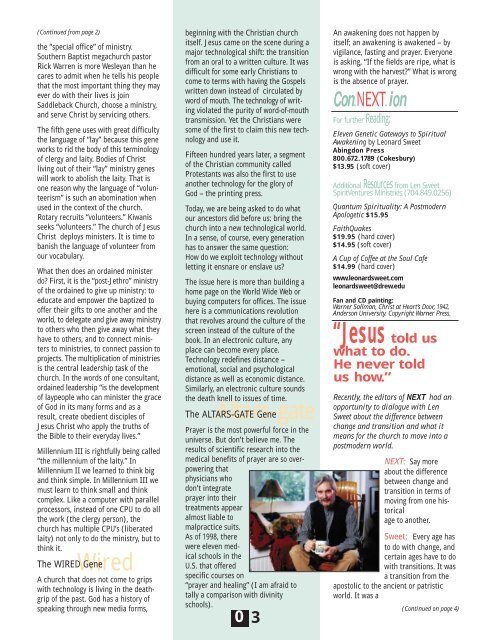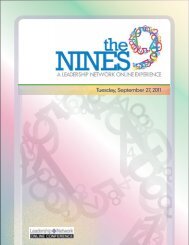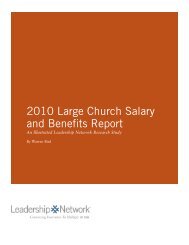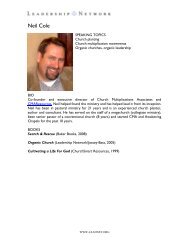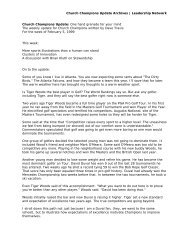ARE WE A PEOPLE AT HALF TIME? - Leadership Network
ARE WE A PEOPLE AT HALF TIME? - Leadership Network
ARE WE A PEOPLE AT HALF TIME? - Leadership Network
You also want an ePaper? Increase the reach of your titles
YUMPU automatically turns print PDFs into web optimized ePapers that Google loves.
(Continued from page 2)<br />
the “special office” of ministry.<br />
Southern Baptist megachurch pastor<br />
Rick Warren is more Wesleyan than he<br />
cares to admit when he tells his people<br />
that the most important thing they may<br />
ever do with their lives is join<br />
Saddleback Church, choose a ministry,<br />
and serve Christ by servicing others.<br />
The fifth gene uses with great difficulty<br />
the language of “lay” because this gene<br />
works to rid the body of this terminology<br />
of clergy and laity. Bodies of Christ<br />
living out of their “lay” ministry genes<br />
will work to abolish the laity. That is<br />
one reason why the language of “volunteerism”<br />
is such an abomination when<br />
used in the context of the church.<br />
Rotary recruits “volunteers.” Kiwanis<br />
seeks “volunteers.” The church of Jesus<br />
Christ deploys ministers. It is time to<br />
banish the language of volunteer from<br />
our vocabulary.<br />
What then does an ordained minister<br />
do First, it is the “post-Jethro” ministry<br />
of the ordained to give up ministry: to<br />
educate and empower the baptized to<br />
offer their gifts to one another and the<br />
world, to delegate and give away ministry<br />
to others who then give away what they<br />
have to others, and to connect ministers<br />
to ministries, to connect passion to<br />
projects. The multiplication of ministries<br />
is the central leadership task of the<br />
church. In the words of one consultant,<br />
ordained leadership “is the development<br />
of laypeople who can minister the grace<br />
of God in its many forms and as a<br />
result, create obedient disciples of<br />
Jesus Christ who apply the truths of<br />
the Bible to their everyday lives.”<br />
Millennium III is rightfully being called<br />
“the millennium of the laity.” In<br />
Millennium II we learned to think big<br />
and think simple. In Millennium III we<br />
must learn to think small and think<br />
complex. Like a computer with parallel<br />
processors, instead of one CPU to do all<br />
the work (the clergy person), the<br />
church has multiple CPU’s (liberated<br />
laity) not only to do the ministry, but to<br />
think it.<br />
The WIRED Gene<br />
Wired<br />
A church that does not come to grips<br />
with technology is living in the deathgrip<br />
of the past. God has a history of<br />
speaking through new media forms,<br />
beginning with the Christian church<br />
itself. Jesus came on the scene during a<br />
major technological shift: the transition<br />
from an oral to a written culture. It was<br />
difficult for some early Christians to<br />
come to terms with having the Gospels<br />
written down instead of circulated by<br />
word of mouth. The technology of writing<br />
violated the purity of word-of-mouth<br />
transmission. Yet the Christians were<br />
some of the first to claim this new technology<br />
and use it.<br />
Fifteen hundred years later, a segment<br />
of the Christian community called<br />
Protestants was also the first to use<br />
another technology for the glory of<br />
God – the printing press.<br />
Today, we are being asked to do what<br />
our ancestors did before us: bring the<br />
church into a new technological world.<br />
In a sense, of course, every generation<br />
has to answer the same question:<br />
How do we exploit technology without<br />
letting it ensnare or enslave us<br />
The issue here is more than building a<br />
home page on the World Wide Web or<br />
buying computers for offices. The issue<br />
here is a communications revolution<br />
that revolves around the culture of the<br />
screen instead of the culture of the<br />
book. In an electronic culture, any<br />
place can become every place.<br />
Technology redefines distance –<br />
emotional, social and psychological<br />
distance as well as economic distance.<br />
Similarly, an electronic culture sounds<br />
the death knell to issues of time.<br />
Altars-gate<br />
The ALTARS-G<strong>AT</strong>E Gene<br />
Prayer is the most powerful force in the<br />
universe. But don’t believe me. The<br />
results of scientific research into the<br />
medical benefits of prayer are so overpowering<br />
that<br />
physicians who<br />
don’t integrate<br />
prayer into their<br />
treatments appear<br />
almost liable to<br />
malpractice suits.<br />
As of 1998, there<br />
were eleven medical<br />
schools in the<br />
U.S. that offered<br />
specific courses on<br />
“prayer and healing” (I am afraid to<br />
tally a comparison with divinity<br />
schools).<br />
0<br />
3<br />
An awakening does not happen by<br />
itself; an awakening is awakened – by<br />
vigilance, fasting and prayer. Everyone<br />
is asking, “If the fields are ripe, what is<br />
wrong with the harvest” What is wrong<br />
is the absence of prayer.<br />
Con.NEXT.ion<br />
For further Reading:<br />
Eleven Genetic Gateways to Spiritual<br />
Awakening by Leonard Sweet<br />
Abingdon Press<br />
800.672.1789 (Cokesbury)<br />
$13.95 (soft cover)<br />
Additional Resources from Len Sweet<br />
SpiritVentures Ministries (704.849.0256)<br />
Quantum Spirituality: A Postmodern<br />
Apologetic $15.95<br />
FaithQuakes<br />
$19.95 (hard cover)<br />
$14.95 (soft cover)<br />
A Cup of Coffee at the Soul Cafe<br />
$14.99 (hard cover)<br />
www.leonardsweet.com<br />
leonardsweet@drew.edu<br />
Fan and CD painting:<br />
Warner Sallman, Christ at Heart’s Door, 1942.<br />
Anderson University. Copyright Warner Press.<br />
“Jesus told us<br />
what to do.<br />
He never told<br />
us how.”<br />
Recently, the editors of NEXT had an<br />
opportunity to dialogue with Len<br />
Sweet about the difference between<br />
change and transition and what it<br />
means for the church to move into a<br />
postmodern world.<br />
NEXT: Say more<br />
about the difference<br />
between change and<br />
transition in terms of<br />
moving from one historical<br />
age to another.<br />
Sweet: Every age has<br />
to do with change, and<br />
certain ages have to do<br />
with transitions. It was<br />
a transition from the<br />
apostolic to the ancient or patristic<br />
world. It was a<br />
(Continued on page 4)


